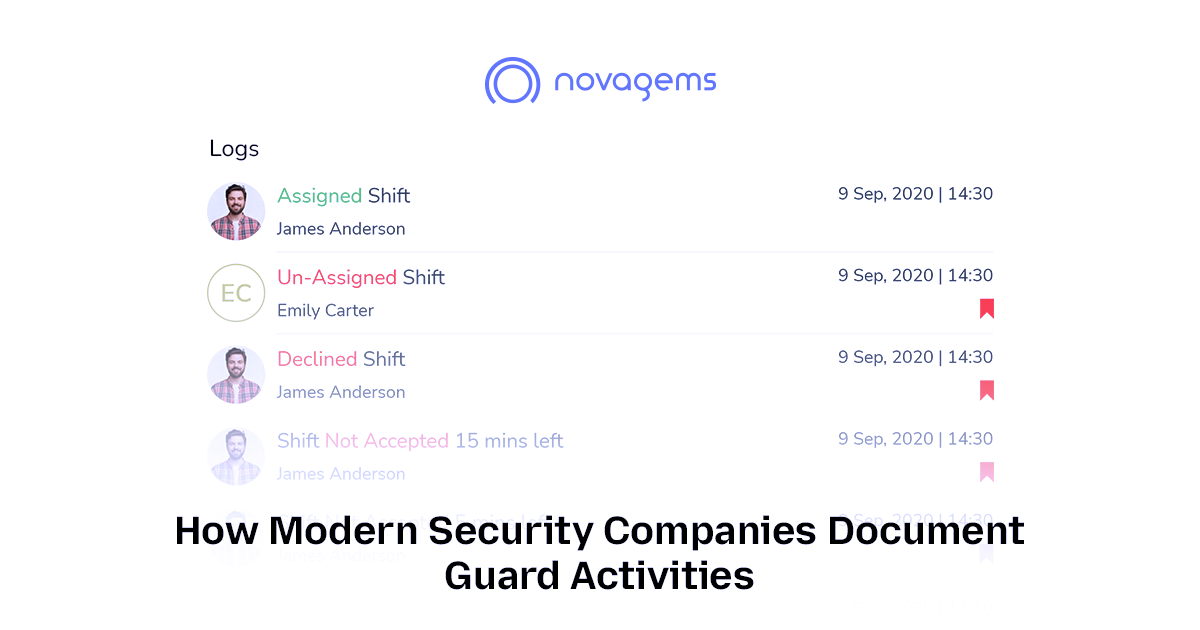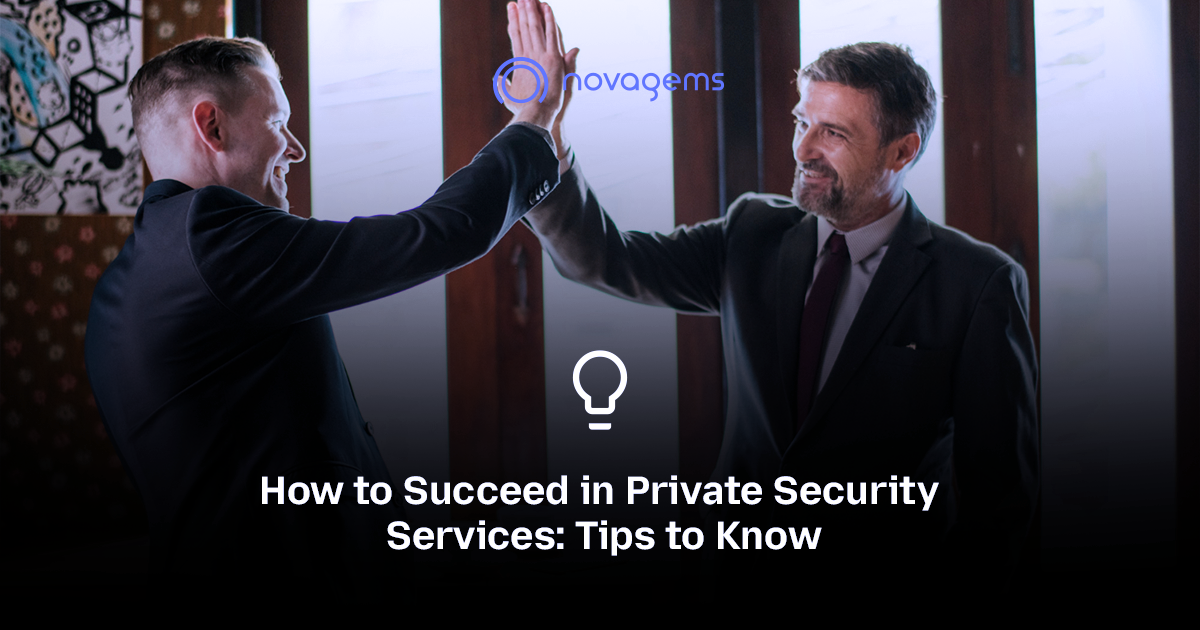How To Get Clients for Your Security Guard Company: Simple 10 Ways
Published on: Tue, Sep 30, 2025
Read in 11 minutes

Finding new clients for your security guard company in Canada or the USA can be challenging. With competition growing and clients demanding more accountability, it’s no longer enough to rely on word of mouth or cheap bids. You need a strategy that combines relationship building, technology, marketing, and professionalism.
In this blog, you’ll learn 10 proven, actionable ways to attract and retain clients—and how using software like Novagems can help you scale faster while maintaining quality.
Key Takeaways
- Winning clients is about trust, visibility, and value—not just low pricing.
- Define your ideal client and focus on the right industries (commercial, event, residential, etc.).
- Use a mix of offline networking and digital marketing (Google, LinkedIn, Local SEO).
- Write professional proposals and include measurable results or SLAs.
- Offer customized services and emphasize technology-driven transparency.
- Build long-term loyalty with consistent quality, reports, and clear communication.
- Implement Novagems guard management software to give clients real-time updates and prove accountability.
Why Getting Clients Is Hard for Security Firms (and What You Need to Know)
Before jumping straight to tactics, it helps to understand why many security firms struggle to land new clients. Knowing the obstacles will help you avoid pitfalls and strengthen your approach.
- High trust barrier/risk perception: Clients are entrusting you with safety, property, reputations, and liability. They tend to be risk-averse. Any hint of unprofessionalism, poor background checks, or lack of track record can kill trust immediately.
- Commoditization & price competition: Many security companies compete only on price, which drives downward margins. Clients see guards as interchangeable, making it easy to go for the cheapest bid.
- Lack of differentiation: If you offer “generic guard services” with no clear USP (unique selling proposition) or technology advantage, clients see little reason to choose you over others.
- Sales & marketing inexperience: Founders or operations teams often focus on deployment, staffing, and training, but neglect outreach, proposal writing, or relationship building.
- Long sales cycles & bid competition: Security contracts often require walks of premises, risk assessments, RFPs, compliance checks, multiple stakeholders, and formal procurement cycles. It’s not a quick “pitch and close” scenario.
- Retention & reputation dependency: Winning a client is only half the battle—delays, shift issues, complaints, response failures can ruin referrals or renewals. Negative word-of-mouth is dangerous in a trust business.
Recognizing these challenges allows you to structure your strategies accordingly—focusing on trust, clarity, differentiation, and a mix of marketing + sales.
Fun fact - As of 2024, there were 108,742 security services businesses in the U.S., growing about 2.7 % per year on average from 2019 to 2024.
Top 10 Tips to Get Clients for Your Security Guard Company
Here are 10 actionable strategies. Each one can be a lever in your growth plan. You don’t need to do it all at once—pick a few you can execute well and gradually expand.
1. Identify Your Ideal Client
You must know who your best clients are (or could be). Trying to serve everyone dilutes your efforts.
- Segment your market: residential communities, commercial complexes, events, industrial / warehouses, hospitals, malls, schools, gated communities.
- Within each, further narrow: e.g., “industrial warehouses over 50,000 sq ft in [your city] with nightly operations.”
- Understand their pain points: theft, vandalism, liability, compliance, regulatory requirements, shift supervision, and guard absenteeism.
- Create a client persona: title (e.g., facility manager, operations head), budget size, decision criteria, procurement cycle.
By targeting, your marketing, proposals, and value messaging become precise and persuasive.
2. Network and Build Relationships
Relationships are gold in security services, especially local and B2B.
- Attend local business events, chambers of commerce meetings, trade fairs, real estate developer meetups, and industry associations (property management, facility management).
- Volunteer or speak at safety or community events. Teach a short talk on security best practices.
- Use LinkedIn: connect with facility managers, property developers, HR heads, and corporate office managers. Engage with their content, comment, share, provide value.
- Walk target sites (commercial complexes, malls): drop your professional leave-behinds (flyers, brochures), and ask to meet decision-makers.
Over time, relationships often lead to referrals, warm leads, or introductions.
3. Write Effective Proposals
A solid proposal can be the difference between winning and losing, especially in competitive bids.
- Use a well-structured template: The template must be easy to read and well organized so that your potential client can easily see the security services you provide.
- Personalize: tailor each proposal to the client’s pain, references, and site specifics.
- Use visuals/infographics: site maps, shift schedules, guard route maps.
- Show ROI or cost-of-risk avoided: e.g., “Using proper guard patrols and deterrents reduces theft/break-ins by X%”
- Follow up with a walkthrough, Q&A session, and clarifications.
Professional proposals build trust and differentiate you from “just another guard company.”
4. Bid Competitively Without Cutting Profits
Price is always a factor. But winning by price alone is dangerous—you’ll erode margins or quality.
- Do a detailed cost breakdown: wages, uniforms, training, supervision, transport, compliance, overheads.
- Benchmark market rates in your region.
- Offer tiered packages (basic, premium) rather than a single low bid.
- Include value-added services (patrol logs, dashboards, incident reporting, guard management software) to justify a premium.
- If a competitor lowballs, ask to break down their pricing (if possible) to see what they’ve skimped on.
- Negotiate smartly: perhaps accept a lower margin but offset via a longer contract or additional upsells.
5. Customize Services to Client Needs
Clients appreciate flexibility and alignment with their specific security risks. Don’t force your standard package on them; tailor it.
- During site visits, perform a mini risk survey and adjust services accordingly (more night patrols, CCTV overlay, parking surveillance, restricted access control).
- Offer add-ons or optional services: mobile patrols, alarm response, armed guard, CCTV monitoring, concierge/security hybrid roles.
- Provide options for frequency, shifts, overtime handling, escalation protocols.
- Build modular service “menus” so clients only pay for what they need.
Customization helps clients see value and feel the solution was made for them.
6. Targeted Networking and B2B Outreach
Beyond general networking, do structured outreach to businesses you’ve identified as potential clients.
- Cold email / calling to facility/security heads, property management firms.
- Use LinkedIn to find decision-makers, research their backgrounds, then send a value-oriented message.
- For local outreach, map businesses in your region (industrial parks, shopping centers) and plan a route to visit them in person.
- Offer free site assessments or safety audits as a lead magnet. “We’ll inspect your property and send back a risk report—no commitment.”
- Use direct mail (professionally designed flyers, brochures) to businesses in your area, with a strong call to action (audit, quote, meeting).
A consistent drip outreach (weekly or monthly) can yield leads over time.
7. Partnerships and Strategic Alliances
Strategic partners help you tap into pre-established networks and trust.
- Partner with alarm / surveillance / CCTV / access control firms. You can offer “manpower + tech” bundled packages.
- Link with property management companies or real estate developers. They often manage multiple sites.
- Tie-up with local locksmiths, building maintenance firms, and cleaning services — they have access to property clients.
- Offer to co-market: your partner refers security, you refer their services. Or offer cross discounts.
- Establish referral reward programs: e.g. 5–10% commission on contract value to referrers.
Partnerships reduce your cold outreach burden and provide credibility by association.
8. Take Advantage of Niche Advertising
Digital marketing helps you reach decision-makers when they are searching.
- Local SEO: optimize your website and landing pages with keywords like security guard services in [city/region], security contracts in [region], security guard software. Use geo modifiers.
- Google Business Profile: claim and optimize your listing. Encourage reviews.
- Paid Ads / PPC: target those searching for “security company near me,” “security guard contract,” “commercial security services.”
- LinkedIn Ads: target facility managers, operations managers, building owners.
- Industry directories & local listing sites: list your company in security or business directories (online directories, B2B platforms).
- Content marketing/blog: create blog posts that answer queries clients have (PAA style), e.g. “how much does a security guard cost per month,” “benefits of guard management software,” “security audits checklist.”
You’ll attract inbound leads from people actively searching for services.
9. Leverage Client Testimonials
Word-of-mouth is critical in trust-sensitive services like security.
- After your work begins, ask satisfied clients for feedback and permission to publish short testimonials or case studies.
- Use those testimonials on your website, proposals, social media, and marketing materials.
- If possible, include quantitative data: “We reduced break-ins by 40%”, “response time improved by 30%.”
- Encourage clients to leave reviews on Google Business Profile, local directories, LinkedIn, and industry forums.
- Share before/after case studies, stories, images (without revealing sensitive info).
Testimonials reassure prospects and improve conversion.
10. Refine your proposal and presentation
Winning often depends on how you present, not just what you propose.
- Practice your pitch: be confident, clear, and concise. Be ready to address objections on cost, guard quality, liability, coverage, and escalation.
- Use visuals, site walk-throughs, demonstrations, mock-ups of guard routes, and digital dashboards.
- Engage stakeholders: invite decision-makers, security, operations, and finance teams during proposal presentation.
- Leave behind a polished summary / one-pager that decision-makers can pass around.
- Always follow up: schedule a feedback call, ask if they need clarification, and offer to rework portions.
A great presentation can tip the balance when proposals are close.
Tips for Keeping Your Security Clients Long-Term
Winning clients is just step one. To build a sustainable business, you must keep clients and grow their contracts.
- Strong onboarding & communication: Set expectations, introduce your team, provide site orientation, explain how reporting works, and schedule regular check-ins.
- Consistent quality & performance monitoring: Use guard management software, GPS tracking, patrol logs, incident reporting, random audits, and supervisor oversight.
- Regular reporting & transparency: Share dashboards, performance metrics, and improvements frequently. When clients see you’re monitoring, they feel in control.
- Upsell add-on services: Once trust is established, propose complementary services (mobile patrol, CCTV monitoring, access control, alarm response).
- Case studies & showcase results: With permission, publish success stories (reduced incidents, cost savings) to reinforce your value and help in cross-selling.
- Solicit feedback & address issues fast: Implement a client feedback loop. Address any complaint promptly to maintain trust.
- Contract renewal incentives: Offer discounts, service upgrades, loyalty bonus for renewals or multi-year commitments.
- Referral incentives: Ask existing clients for referrals, offer small rewards or discounts. Happy clients are often your best promoters.
How Novagems Can Help You Provide Quality Service to Your Clients
One of the biggest differentiators you can bring to the table is technology & transparency. That’s where a tool like Novagems becomes powerful. Here’s how Novagems can help you lock in clients and retain them:
- Shift & schedule management: Create, edit, and manage guard shifts with drag-and-drop tools, spot conflicts early, and ensure coverage.
- Time & attendance tracking: GPS-based clock-in/out with geofencing. This ensures guards are where they should be, removing doubt and enhancing trust.
- Live GPS tracking: Real-time guard movement monitoring. Clients can see guard positions or patrol progression.
- Patrol tours (NFC/QR checkpoints): Guards scan checkpoints to verify route compliance. You can show patrol completeness to clients.
- Incident & activity reporting: Guards submit digital reports (with notes, images). Clients get structured data and alerts.
- Task management: Assign site-specific duties or instructions and track completion.
- Lone worker/panic button: For higher-risk sites, panic alerts and location sharing increase guard safety (gives clients confidence).
- Visitor management: Log entries/exits at client sites.
- Analytics & client reports: Dashboards and custom reports you can share with clients (performance, incidents, compliance).
- Payroll & timesheets: Automate hour calculations, overtime, reduce admin overhead.
- License & certification tracking: Store guard credentials and get alerts about renewals — helps you stay compliant and professional.
By integrating Novagems into your operations, you can present clients with real-time transparency, data-driven reporting, and accountability — elements many competitors won’t offer.
Conclusion
Getting clients for your security guard company requires more than a few ads or cold calls—it’s about building trust, professionalism, and visibility.
To recap:
- Define your niche and ideal client.
- Build relationships through networking and partnerships.
- Leverage SEO, ads, and content marketing to get found.
- Use proposals and testimonials to stand out.
- Retain clients through transparent, consistent service powered by Novagems.
By combining people, processes, and technology, you’ll not only attract more clients, but keep them for years to come. To show you the data, in the U.S. guard/patrol arena, data suggests that the top 4 companies account for ~ 40.7 % of market share.
FAQs
1. How do security companies find clients in the USA and Canada?
They combine local networking, online marketing, and referrals. Most successful firms use tools like Google My Business, attend local events, and partner with property managers.
2. What is the best way to market a security guard company?
Focus on Local SEO, content marketing, and paid ads. Create blogs answering common client questions and run ads targeting “security services near me.”
3. How do I write a proposal for a security contract?
Start with a summary of client issues, your security solution, site coverage details, technology tools, pricing, and testimonials. End with SLAs and contact info.
4. How much does it cost to hire a security guard in Canada or the USA?
Rates range from $25–$50 per hour, depending on region, licensing, and risk level. Specialized or armed guards may charge more.
5. How can software like Novagems help my company win clients?
By automating scheduling, GPS tracking, and reporting, Novagems builds transparency and credibility—two factors clients value most in choosing a security provider.
6. How do I retain security clients long-term?
Deliver consistent service, communicate proactively, share performance reports, and use feedback loops. Long-term clients come from reliability and accountability.
Get a Free Trial
Sign up For Newsletter
Latest Blog Posts
Get Started
Start being productive & grow your business
with Novagems





